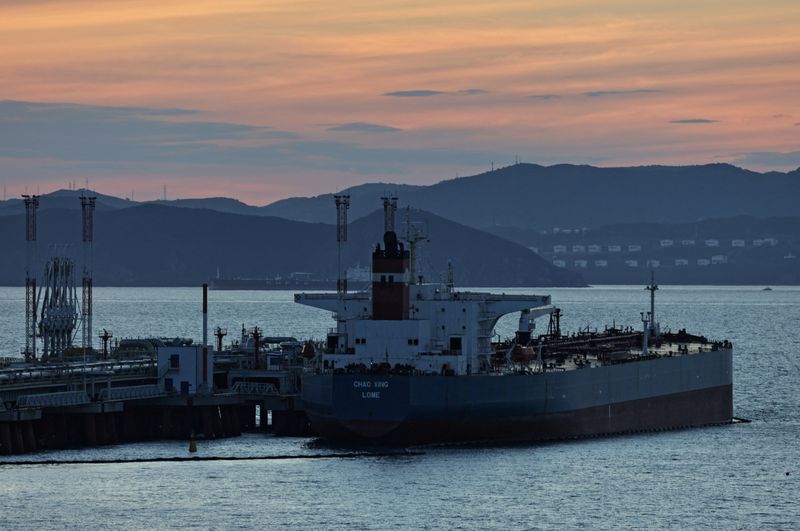
By Colleen Howe
BEIJING (Reuters) – Oil prices slipped at market open on Tuesday but remained near four-month highs as Chinese and Indian buyers sought new suppliers in the wake of the Biden administration’s toughest sanctions yet on Russian oil.
Brent LCOc1 futures slipped 22 cents, or 0.27%, to $80.79 a barrel by 0122 GMT, while U.S. West Texas Intermediate (WTI) crude fell 16 cents, or 0.2% to $78.66 a barrel.
That followed roughly 2% gains in Monday trading, after the U.S. Treasury Department on Friday imposed sanctions on Gazprom (MCX:GAZP) Neft and Surgutneftegas as well as 183 vessels that trade oil as part of Russia’s so-called “shadow fleet” of tankers. The move is expected to cost Russia billions of dollars per month, according to one U.S. official.
“A large portion of Russia’s shadow tanker fleet has been sanctioned, making it more difficult for Russia and buyers to circumvent the G-7 price cap. These sanctions have the potential to take as much as 700,000 barrels per day (bpd) of supply off the market, which would erase the surplus that we are expecting for this year,” ING analysts said in a note.
But the analysts added the actual impact would probably be less as buyers and sellers found ways to continue getting around the sanctions.
Robert Rennie, head of commodity and carbon strategy at Westpac, said the new measures could affect 800,000 bpd of Russian crude exports for “an extended period” and as much as 150,000 bpd of diesel exports.
As a result, Brent prices could near $85 per barrel, Rennie said, pointing also to the extension of OPEC+ production cuts.
Goldman Sachs had said on Friday that Brent prices could top $85 per barrel in the short term and $90 if a decline in Russian output coincided with a reduction in Iranian production.
U.S. President Joe Biden said prices would stabilise after the sanctions and they were not meant to impact the pocketbooks of U.S. consumers.

Weaker demand from major buyer China could blunt the impact of the tighter supply. China’s crude oil imports fell in 2024 for the first time in two decades outside of the COVID-19 pandemic, official data showed on Monday.
Six European countries on Monday also called on the EU to lower its $60 a barrel price cap on Russian seaborne crude and refined oil products, measures aimed at reducing Russia’s ability to wage war in Ukraine.
This post is originally published on INVESTING.


